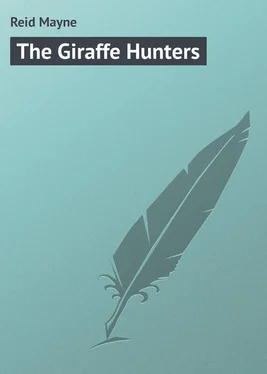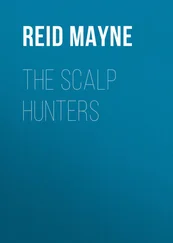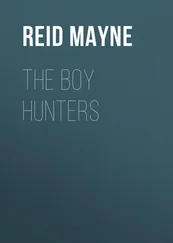Mayne Reid - The Giraffe Hunters
Здесь есть возможность читать онлайн «Mayne Reid - The Giraffe Hunters» — ознакомительный отрывок электронной книги совершенно бесплатно, а после прочтения отрывка купить полную версию. В некоторых случаях можно слушать аудио, скачать через торрент в формате fb2 и присутствует краткое содержание. Жанр: foreign_language, foreign_prose, на английском языке. Описание произведения, (предисловие) а так же отзывы посетителей доступны на портале библиотеки ЛибКат.
- Название:The Giraffe Hunters
- Автор:
- Жанр:
- Год:неизвестен
- ISBN:нет данных
- Рейтинг книги:3 / 5. Голосов: 1
-
Избранное:Добавить в избранное
- Отзывы:
-
Ваша оценка:
- 60
- 1
- 2
- 3
- 4
- 5
The Giraffe Hunters: краткое содержание, описание и аннотация
Предлагаем к чтению аннотацию, описание, краткое содержание или предисловие (зависит от того, что написал сам автор книги «The Giraffe Hunters»). Если вы не нашли необходимую информацию о книге — напишите в комментариях, мы постараемся отыскать её.
The Giraffe Hunters — читать онлайн ознакомительный отрывок
Ниже представлен текст книги, разбитый по страницам. Система сохранения места последней прочитанной страницы, позволяет с удобством читать онлайн бесплатно книгу «The Giraffe Hunters», без необходимости каждый раз заново искать на чём Вы остановились. Поставьте закладку, и сможете в любой момент перейти на страницу, на которой закончили чтение.
Интервал:
Закладка:
Without taking the trouble to ascertain whether the fierce brute had been killed outright, they turned their attention to the carcass.
The horse was Arend’s, but there was not the slightest trace of the rider. Whatever had been his fate, there was no sign of his having been killed along with his horse. There was still a hope that he had made his escape, though the finding of the horse only added to their apprehensions.
“Let us find out,” counselled Hendrik, “whether the horse was killed where it is now lying, or whether it has been dragged hither by the lion.”
After examining the ground, Congo declared that the horse had been killed upon the spot, and by the lion.
This was strange enough.
On a further examination of the sign, it was found that one of the horse’s legs was entangled in the rein of the bridle. This explained the circumstance to some extent, otherwise it would have been difficult to understand how so swift an animal as a horse should have allowed itself to be overtaken upon an open plain.
“So much the better,” said Groot Willem. “Arend never reached this place along with his horse.”
“That’s true,” answered Hendrik, “and our next move will be to find out where he parted from his saddle.”
“Let us go back,” said Willem, “and more carefully examine the tracks.”
During this conversation, the hunters had reloaded their rifles, and now remounted for the purpose of riding back.
“Baas Willem,” suggested Congo, “let Spoor’em try ’bout here little more.”
This suggestion was adopted, and Congo, setting on the hound, proceeded to describe a larger circle around the spot.
After reaching a part of the plain where they had not yet been, the Kaffir called out to them to come to him.
They rode up, and were again shown the spoor of Arend’s horse leading away from where its carcass was now lying, and in the opposite direction from the camp.
It was evident that the horse had been farther off than the spot where its remains now rested. It had probably lost its rider beyond, and was on its return to the camp when killed by the lion.
Once more Spoor’em started along the track, Congo keeping close to his tail, the two horsemen riding anxiously after.
But we must return to the camp, and follow the trail of the lost hunter by a means more sure than even the keen scent of Spoor’em.
Chapter Seven.
The Lost Hunter
As Arend came up to the horse that had wandered from the camp, the animal had arrived at the edge of an extensive thicket, and was apparently determined upon straying still farther. To avoid being caught or driven back, it rushed in among trees, taking a path or trace made by wild animals.
Arend followed.
The path was too narrow to allow of his heading the stray; and, apprehensive of losing it altogether, the youth followed on in hopes of coming to a wider track, where he might have a chance of passing the runaway and turning it towards the camp.
This hope seemed about to be realised, as the truant emerged from the thicket and entered upon an open plain clothed with low heath, – the Erica vestila , loaded with white blossoms.
The hunter was no longer obliged to follow upon the heels of the runaway, – the horse; and spurring his own steed, he made an attempt to get past it. But the horse, perhaps inspired by a recollection of the pack-saddle and its heavy load, broke off into a gallop.
Arend followed, increasing his own speed in like proportion. When nearly across the plain, the runaway suddenly stopped and then bolted off at right angles to the course it had been hitherto pursuing.
Arend was astonished, but soon discovered the cause of this eccentric action, in the presence of a huge black rhinoceros, – the borelé – which was making a straight course across the plain, as if on its way to the river.
The runaway horse had shied out of its way; and it would have been well for the horseman if he had shown himself equally discreet. But Arend Von Wyk was a hunter, – and an officer of the Cape Militia, – and as the borelé passed by him, presenting a fine opportunity for a shot, he could not resist the temptation to give it one.
Pulling up his horse, or rather trying to do so, for the animal was restive in the presence of such danger, he fired. The shot produced a result that was neither expected nor desired. With a roar like the bellowing of an angry bull, the monster turned and charged straight towards the horseman.
Arend was obliged to seek safety in flight, while the borelé pursued in a manner that told of its being wounded, but not incapacitated from seeking revenge.
At the commencement of the chase, there was but a very short distance between pursuer and pursued; and in place of suddenly turning out of the track, and allowing the monster to pass by him, – which he should have done, knowing the defect of vision natural to the rhinoceros, – the young hunter continued on in a straight line, all the while employed in reloading his rifle.
His mistake did not originate in any want of knowledge, or presence of mind, but rather from carelessness and an unworthy estimate of the abilities of the borelé to overtake him. He had long been a successful hunter, and success too often begets that over-confidence which leads to many a mischance, that the more cautious sportsman will avoid.
Suddenly he found his flight arrested by the thick scrub of thorny bushes, known in South Africa as the “wait a bits”, and the horse he was riding did wait a bit, – and so long that the borelé was soon close upon his heels.
There was now neither time nor room to turn either to the right or left.
The rifle was at length loaded, but there would have been but little chance of killing the rhinoceros by a single shot, especially with such uncertain aim as could have been taken from the back of a frightened horse.
Arend, therefore, threw himself from the saddle. He had a twofold purpose in doing so. His aim would be more correct, and there was the chance of the borelé keeping on after the horse, and leaving him an undisturbed spectator of the chase.
The field of view embraced by the eyes of a rhinoceros is not large; but, unfortunately for the hunter, as the frightened horse fled from his side, it was he himself that came within the circumscribed circle of the borelé’s vision.
Hastily raising the rifle to his shoulder he fired at the advancing enemy, and then fled towards a clump of trees that chanced to be near by.
He could hear the heavy tread of the rhinoceros as it followed close upon his heels. It seemed to shake the earth. Closer and closer he heard it, so near that he dared not stop to look around. He fancied he could feel the breath of the monster blowing upon his back. His only chance was to make a sudden deviation from his course, and leave the borelé to pass on in its impetuous charge. This he did, turning sharply to the right, when he saw that he had just escaped being elevated upon the creature’s horn.
This manoeuvre enabled him to gain some distance as he started off in the new direction. But it was not long maintained; for the borelé was again in hot pursuit, without any show of fatigue; while the tremendous exertions he had himself been making rendered him incapable of continuing his flight much longer. He had just sufficient strength left to avoid an immediate encounter by taking one more turn, when, fortunately, he saw before him the trunk of a large baobab-tree lying prostrate along the ground. It had been blown down by some mighty storm, and lay resting upon its roots at one end, and its shivered branches at the other, so as to leave a space of about two feet between its trunk and the ground.
Suddenly throwing himself down, Arend glided under the tree, just in time to escape the long horn, whose point had again come in close proximity with his posterior.
Читать дальшеИнтервал:
Закладка:
Похожие книги на «The Giraffe Hunters»
Представляем Вашему вниманию похожие книги на «The Giraffe Hunters» списком для выбора. Мы отобрали схожую по названию и смыслу литературу в надежде предоставить читателям больше вариантов отыскать новые, интересные, ещё непрочитанные произведения.
Обсуждение, отзывы о книге «The Giraffe Hunters» и просто собственные мнения читателей. Оставьте ваши комментарии, напишите, что Вы думаете о произведении, его смысле или главных героях. Укажите что конкретно понравилось, а что нет, и почему Вы так считаете.












